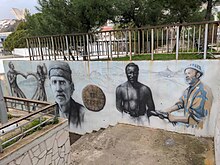Rizo Šurla
Rizo Šurla | |
|---|---|
Ризо Шурла | |
 Mural in Ulcinj depicting afro-albanian photographer Rizo Šurla (second from the right) (16/02/2024) | |
| Born | 12 January 1922 |
| Died | 11 February 2003 (aged 81) |
| Nationality | Yugoslav (now Montenegrin) |
| Occupation(s) | Photographer, actor |
Rizo Šurla (Montenegrin: Ризо Шурла; Albanian: Rizo Shurdha; 12 January 1922 – 11 February 2003), also known as Rizo Harapi, was a Montenegrin photographer, actor and anti-fascist fighter who fought in the ranks of the Yugoslav Partisans during World War II.
Biography
[edit]Rizo Šurla was born on 12 January 1922 in Ulcinj, then part of the Kingdom of Yugoslavia. His family belonged to the Afro-Albanian community of Ulcinj.[1] African slaves had been brought by the captains of the fleet of Ulcinj in the 18th century.[2] In the 19th century, they gained their freedom and began to integrate themselves in the local community. His father, Saidi, was a direct descendant of the first Africans who settled in Ulcinj and his mother, Fatima was a local from Ulcinj.[3] In his youth he was involved in boxing and worked as a waiter in Dubrovnik.[4] He then went to Belgrade, where he learned the craft of photography.[2] During World War II, he joined the Yugoslav Partisans.[5] After the war, he returned to Ulcinj, where he opened the first photographic studio in the city, which for a long time was the only one. In 1976 he played in the movie Jagoš and Uglješa.[3] He married a Montenegrin from Ulcinj named Nada Račić, with whom he had two children.[2]
He died on 11 February 2003 in his hometown. He was one of the last black representatives in the city.[2]
References
[edit]- ^ Canka, Mustafa (2013). "Only Memories and Emptiness Remain: The History of Ulcinj's Afro-Albanian Community in Montenegro". LeftEast.
- ^ a b c d "Riza otišao u legendu". www.novosti.rs (in Serbian (Latin script)). Retrieved 13 June 2020.
- ^ a b "Rizo Šurla, crnac iz Crne Gore: Uvek sаm se osećаo Jugoslovenom, nаšа zemljа je jedinstvenа u svetu". Retrieved 13 June 2020.
- ^ "Dubrovnik 1933: RIZO SHURDHA PARA KAFENESË SË QYTETIT (foto) | Lajme me te fundit nga Ulqini dhe rajoni". 5 December 2016. Retrieved 13 June 2020.
- ^ "Potomci afričkih robova trajno obilježili istoriju Ulcinja + Foto". Lajme nga Ulqini (in Albanian). 2 February 2013. Retrieved 13 June 2020.


 French
French Deutsch
Deutsch